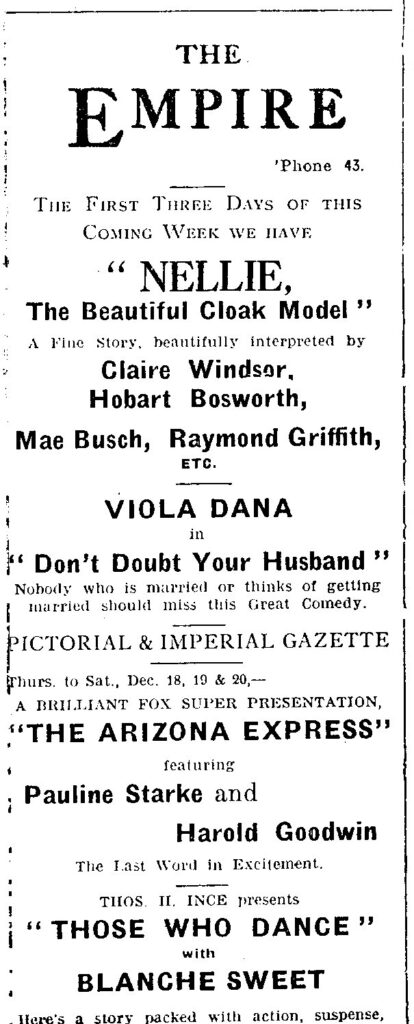A ‘Betwixtmas’ trip to the cinema, perhaps?
31 December 2020

‘The cinema has always been a big attraction to the British public and nowhere more so than in Loughborough, where at different times we had one, two, three and four different cinemas operating. My first visit was with my mother in the early twenties. This was the new Victory Cinema, where I saw Charlie Chaplin and Jackie Coogan in The Kid. I shall never forget it.’
‘The next stupendous step for the entertainment of the people of Loughborough, was the talkies. The same cinema was the first to be wired for sound. For several weeks all the talkies we would see were shorts consisting of a phone conversation between two persons, someone singing a song or Olivier reciting from Henry V. But the main films were still silent.’
‘In about 1929 came the first full-length feature talkies to be shown in Loughborough. This was the Donovan Affair with Jack Holt, and almost all of the action took place in two rooms. Then came those great Hollywood musicals.’
‘The Victory was managed by Mr Higgins, who controlled the younger patrons with a rod of iron but was meekness personified when the well-to-do arrived in their best attire for the evening performances.’
‘The Empire did not have sound until sometime after the Victory, and I believe the first talkie was Rio Rita with Bebeh Daniels.’
‘The three cinemas belonged to a Mr Deeming who lived at One Ash, between Loughborough and Quorn. Every night one could see a member of staff taking the newsreels from one cinema to another, where they were shown at different times.’
‘Then came a competitor for the three. J Arthur Rank was to build an Odeon cinema on the site of the old GPO in Baxtergate. I worked on the construction of the Odeon from approximately January to October 1936. The first film to be shown at the Odeon was Mr Deeds Goes to Town, with Gary Cooper. One of the early films shown there was Rosemary, with Nelson Eddy and Jeanette MacDonald, and I went to see that film with my wife May for our first date.’
‘To combat the threat of competition from the Odeon, Mr Deeming and his fellow directors carried out huge investments. Firstly, the Empire was completely rebuilt and a brick-by-brick race appeared to be on to see which would open first. In fact, the main orders of both buildings were delivered almost to the day and severe disruption to traffic was caused along Nottingham Road, Baxtergate and the Marketplace. As far as the Victory was concerned, a large amount of money was spent on improvements for the comfort of the patrons, including the revolutionary idea of installing double seats on the back two rows of the balcony. My wife-to-be and I didn’t mind seeing a bad film under these new circumstances.’
‘Years ago the Empire boasted a beautiful ballroom where many of the large business firms held their annual functions. It was said to be one of the finest dance floors in the country.’
‘Another pleasant job we were asked to do occasionally was selling programmes at the Empire cinema celebrity concerts which were held on Sunday afternoons. At the commencement of the concert we were allowed to stay and listen. Some of the famous people who appeared were Cyril Smith the pianist, Anna Ziegler and Webster Booth, Yehudi Menuin and many more who gave their services free for charity.’
‘On the ground floor, in the foyer, there was a very popular coffee bar which was a favourite meeting place of students and other young people in the town.’
‘When the Empire Cinema was rebuilt there was a ballroom where you would have a meal and a dance. There were three cinemas – the Victory, the Empire and later the Odeon.’
‘On Saturday afternoons we went to the pictures – tuppence admission and a penny bag from a market sweet stall. If the cinema was full we will put two in a seat. We saw Hoot Gibson, cowboy films and thriller films as serials. ‘Come next week and see what the green Archer does!’ Mr Higgins was the manager of the Victory Cinema and you had to behave yourself.‘
‘On Saturday morning a strange hush came over the street as we all went to the Playhouse Cinema, ‘the flea pit,’ to see the latest instalment of Pearl White in ‘The Perils of Pauline’ or Elmo Lincoln in ‘Elmo the Mighty’ or some other earth-shattering drama. Later the Playhouse became the Palais de Danse and some of us patronised it for another purpose.’
Extracts from ‘Loughborough As I Remember It (Memories of the Town before 1945.)’ (Various contributors. edited by Jean Carswell, published by Leics Libraries, 1988)
Collated by Alison Mott